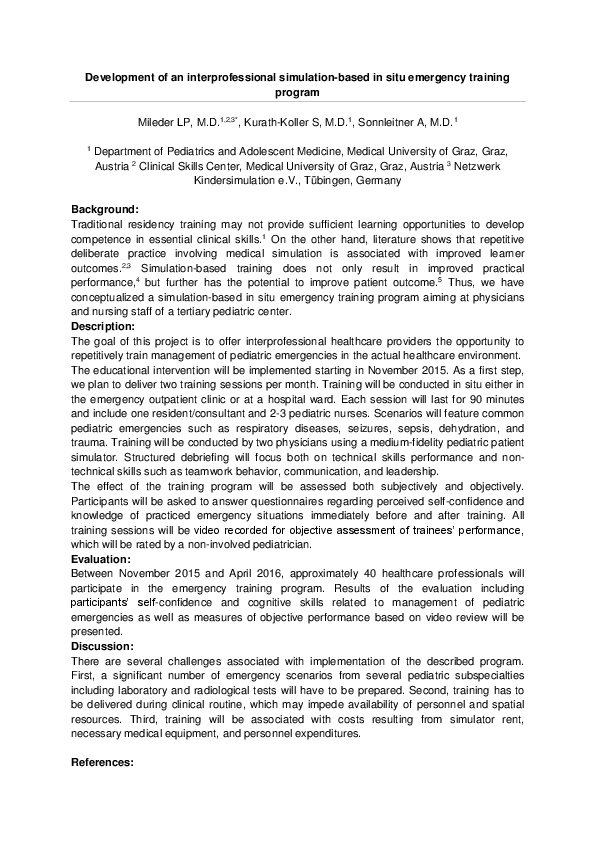Abstract
Background:
Traditional residency training may not provide sufficient learning opportunities to develop competence in essential clinical skills. On the other hand, literature shows that repetitive deliberate practice involving medical simulation is associated with improved learner outcomes. Simulation-based training does not only result in improved practical performance, but further has the potential to improve patient outcome. Thus, we have conceptualized a simulation-based in situ emergency training program aiming at physicians and nursing staff of a tertiary pediatric center.
Description:
The goal of this project is to offer interprofessional healthcare providers the opportunity to repetitively train management of pediatric emergencies in the actual healthcare environment.
The educational intervention will be implemented starting in November 2015. As a first step, we plan to deliver two training sessions per month. Training will be conducted in situ either in the emergency outpatient clinic or at a hospital ward. Each session will last for 90 minutes and include one resident/consultant and 2-3 pediatric nurses. Scenarios will feature common pediatric emergencies such as respiratory diseases, seizures, sepsis, dehydration, and trauma. Training will be conducted by two physicians using a medium-fidelity pediatric patient simulator. Structured debriefing will focus both on technical skills performance and non-technical skills such as teamwork behavior, communication, and leadership.
The effect of the training program will be assessed both subjectively and objectively. Participants will be asked to answer questionnaires regarding perceived self-confidence and knowledge of practiced emergency situations immediately before and after training. All training sessions will be video recorded for objective assessment of trainees’ performance, which will be rated by a non-involved pediatrician.
Evaluation:
Between November 2015 and April 2016, approximately 40 healthcare professionals will participate in the emergency training program. Results of the evaluation including participants’ self-confidence and cognitive skills related to management of pediatric emergencies as well as measures of objective performance based on video review will be presented.
Discussion:
There are several challenges associated with implementation of the described program. First, a significant number of emergency scenarios from several pediatric subspecialties including laboratory and radiological tests will have to be prepared. Second, training has to be delivered during clinical routine, which may impede availability of personnel and spatial resources. Third, training will be associated with costs resulting from simulator rent, necessary medical equipment, and personnel expenditures.






